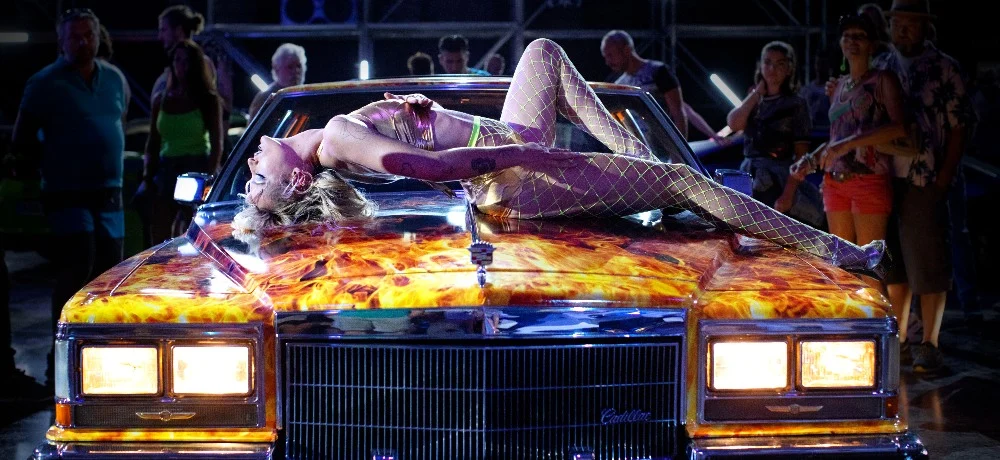






I’ve been trying to wrap my head around Julia Ducournau’s sophomore feature film Titane now for several days, and I’m still trying to figure out just what exactly I should - or even could - say about her full-throttle idiosyncratic exploration of love and family that’s also a body horror mash-up about a woman whose childhood trauma now manifests in sexual encounters with automobiles (and that’s not even all of it). I had even bandied about a joke in my head on how Titane puts the auto in autoerotica, but even my lame Dad joke still only captures just a portion of what’s really going on in this film. There’s a key moment in the film where Ducournau pivots her narrative in an entirely new direction that becomes the beating heart of her visual thesis in Titane: the collision of the humane and the inhuman and how trauma shapes our connections and experiences in our lives, and it’s where Titane fully solidifies its status as one of the most thematically innovative cinematic stories of 2021.
At the beginning of Titane, a young Alexia (Adèle Guigue) is doing her best to annoy her father from the backseat while he drives, distracting him to a point where their car crashes and doctors can only save Alexia through cranial surgery that implants a titanium plate into her head, and leaves her with intricate scar tissue behind her right ear. From there, we meet up with an older Alexia (Agathe Rousselle) who now works as a dancer at a car show, where she grinds and rubs her body all over a classic Caddy covered with flaming decals while onlookers watch her performance enthusiastically.
It’s apparent within the first 15 minutes of Titane that there’s nothing typical about Alexia, but just in case you were thinking “Well, maybe things will eventually level out for her,” Ducournau then gives us one of the wildest sex scenes of the last two decades as Alexia finds herself being ferociously railed by the low-rider. At that moment, I couldn’t help but imagine that this scene was akin to if David Cronenberg’s Crash somehow merged with one of the earlier entries of the Fast and the Furious series, the perfect blending of a stylized gaze of vehicular machinations and hypererotica.
After Alexia’s sexual encounter with the vehicle, her sociopathic tendencies begin to manifest themselves in uncontrollable ways, where she cannot help but inflict pain on those around her as she seemingly rejects organic life in favor of life surrounded by the man-made qualities of steel and wheels. Her dangerous proclivities put her on the run, where Alexia transforms herself and pretends to be the long-missing son of Vincent (Vincent Lindon), a no-nonsense fire captain whose son’s disappearance has made him desperate to step back into a parental role once again. At this point in Titane, Ducournau once again shifts gears, and the narrative becomes something of a family drama that is centered around a unique set of circumstances and tender-heartedly examines how our ability to connect with others is often the very thing that can save us from our own inhumanity.
With Titane, Ducournau amps up her cinematic exploration of familial structures that she first established in Raw years ago, this time delivering a story about how the most unlikely of connections can inexplicably create deep-rooted relationships that most of the outside world would either dismiss completely or look down upon with disdain. Somehow, Ducournau manages to create one of the most visceral, yet good-natured, genre-benders to come out in some time, an often disturbing story that pushes boundaries but still manages to deliver an inquisitive exploration of what it means to be human.
Ducournau presents her story to audiences with flourishes of excess and a smattering of pitch-black humor in the first half of the film, where you think you may have an inkling of where her story is headed. But then in the latter half of Titane, the French filmmaker demonstrates great poise and restraint as we watch Alexia and Vincent come together under the most unusual of circumstances, and together, they are able to find a sense of belonging despite their relationship being built on a foundation of lies, because ultimately, those lies don’t matter to these characters. Their connection is so much bigger than that and I love how messy the familial dynamic between these characters is because their connection shouldn’t make sense traditionally, but it does, thanks to Ducournau’s efforts here.
As mentioned, there are also some body horror elements to Titane that are terrifyingly weird and messed up, and while I always appreciate watching a character’s body betray them on screen, I think that these otherworldly moments take away from the powerful messages at the core of Titane, but not in a way that diminishes Ducournau’s efforts at all. Like I said, the body horror stuff is fun and adds a lot of intriguing visuals for the film, but I don’t think Titane necessarily needed an infusion of the supernatural into its script to take it to the next level, because it already exceeded those levels and then some with everything else going on in the film’s ambitious narrative.
With Titane, Ducournau demonstrates with pure confidence that she is truly one of the ballsiest filmmakers working today, as her second feature completely defied any expectations I had going into it. Titane also left me rocked by how well its beautifully bizarre story was able to blend together Ducournau’s acerbic wit and her razor-sharp exploration of humanity and identity with this gentle story about adoptive families, leaving me euphoric and heartbroken by the time we get to its conclusion. Titane certainly won’t be a film for everyone, but for those who prefer boundary-pushing cinema, Ducournau’s latest should undoubtedly take you on a helluva ride.
Movie Score: 4/5